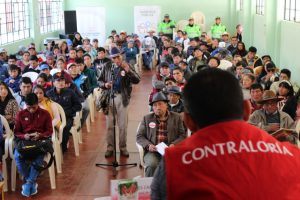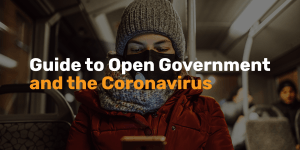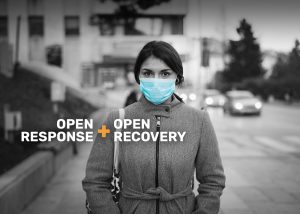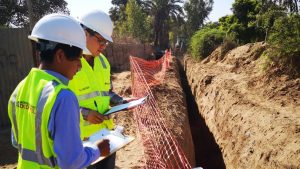Citizen Participation in Auditing: The Key to Open Response and Recovery
La participación ciudadana en la fiscalización: Pieza central para una respuesta y recuperación abiertas
Supreme Audit Institutions (SAIs) are essential to identify and mitigate the risks associated with the use of power and with the mobilization of the extraordinary funds allocated to the economic and social measures rolled out to respond to the COVID-19 pandemic and its consequences.
Open Government Partnership’s (OGP) agenda has evolved toward an open state perspective, positioning SAIs in this space and facilitating the inclusionOGP participating governments are working to create governments that truly serve all people. Commitments in this area may address persons with disabilities, women and girls, lesbian, gay, bisexual, tr... More of open government commitments put forward by SAIs. These commitments can be the foundation of an integrated accountability system, allowing for an open, sustained recovery from the crisis brought about by the pandemic.
In its third action plan (2017-2019), Argentina committed to conducting training and participation workshops about thematic areas jointly identified by SAIs and civil society. This led to a second commitment established in its fourth action planAction plans are at the core of a government’s participation in OGP. They are the product of a co-creation process in which government and civil society jointly develop commitments to open governmen... (2019-2021) to strengthen citizen monitoring of the recommendations put forward by auditing authorities, which is fundamental for effective accountability.
With transformative potential, the commitment established by the Comptroller General of the republic (CGR in Spanish) as part of Peru’s fourth action plan (2019-2021) aims to promote social control through monitoring of the execution of public works via the platform INFOBRAS, which includes geotagged information about expenses and its execution.
This commitmentOGP commitments are promises for reform co-created by governments and civil society and submitted as part of an action plan. Commitments typically include a description of the problem, concrete action... demands the interoperability of three public information systems for planning, control, and execution of resources and projects: the financial administration system (SIAF in Spanish), the public investment system (SNIP), and the electronic system for state contracting (SEACE). With this information available at INFOBRAS, citizens can undertake social control and flag any potential misuses. Patricia Guillen, deputy manager for citizen participationAccording to OGP’s Articles of Governance, citizen participation occurs when “governments seek to mobilize citizens to engage in public debate, provide input, and make contributions that lead to m... More at Peru’s CGR, stated “Through the Citizen Monitoring Program, there is an ongoing analysis of the status of works and field verification by trained and certified citizens. These reports provide feedback and alert the CGR of any necessary control activities.
What value does OGP add to civil society organizations and supreme audit institutions?
As Joaquin Caprarulo from Asociación Civil por la Igualdad y Justicia (ACIJ) stated at the international seminar on citizen participation and auditsInstitutional and legal frameworks are necessary for providing assurance of the integrity of financial information and of compliance with budgetary rules and procedure. Technical specifications: These...: OGP “stimulates receptivity to civil society demands due to the size and international visibility of this partnership, the credibility of its approach and members, thus increasing trust of proposals put forward by civil society.”
A recent study on citizen participation and SAI of Latin America shows that the co-creation processCollaboration between government, civil society and other stakeholders (e.g., citizens, academics, private sector) is at the heart of the OGP process. Participating governments must ensure that a dive... means that CSOs “are not guests but key players that co-lead this initiative, making power dynamics less unequal and participation spaces broader than those put forward by SAIs.”

By working with other entities from the accountability ecosystem, OGP presents SAIs with the opportunity to benefit from innovative citizen participation practices beyond channels to report claims and consultation mechanisms, into a collaborative approach, interaction among a broad range of national and international stakeholders, and enhancement of the impact of control.
How to move forward and create more SAI commitments in OGP?
At the national level, to promote an open state approach, countries require effective coordination among the national points of contact (usually at the Executive branch) and other agencies. At the regional and global levels, dialogue and cooperation are needed among OGP and global and regional SAIs, as well as multilateral partners of OGP and SAIs.
To sum up, as Carolina Cornejo, Head of Open Government of Argentina and co-chair of OGP said, “In the context of a global pandemic where the response to COVID-19 demands inter-institutional coordination, as well as monitoring and control of public interventions implemented during these extraordinary circumstances, the integration of SAIs into the OGP process is more important than ever.”
*The opinions expressed in this blog are those of the author and do not necessarily represent that of the United Nations
Las Entidades Fiscalizadoras Superiores (EFS) son fundamentales para identificar y mitigar los riesgos en el uso de poderes y en la movilización de recursos extraordinarios relacionados con las medidas económicas y sociales para afrontar la pandemia del COVID-19 y sus consecuencias.
La evolución de la agenda de la Alianza para el Gobierno Abierto (OGP por sus siglas en inglés) hacia una óptica de Estado Abierto ha contribuido al reconocimiento de las EFS en este espacio, permitiendo que los planes nacionales de gobierno abierto de algunos países también incluyan compromisos por parte de EFS. Estos compromisos pueden ser el cimiento para fortalecer sistemas integrales de rendición de cuentas que permitan una recuperación más abierta y sostenible de la crisis ocasionada por la pandemia.
En Argentina, el tercer plan de acción (2017-2019) incluyó un compromiso para realizar capacitación y talleres de participación sobre temáticas identificadas conjuntamente entre la EFS y la sociedad civil. Esta primera experiencia llevó a un segundo compromiso de la EFS en el cuarto plan (2019-2021) para avanzar la participación ciudadana en el seguimiento a las recomendaciones de las auditorías, cuestión clave para una rendición de cuentas efectiva.
Con un potencial transformador significativo, el compromiso de la Contraloría General de la República (CGR) en el cuarto plan de acción de Perú (2019-2021) consiste en promover el control social mediante el seguimiento a la ejecución de proyectos de infraestructura, a través de la plataforma INFOBRAS, que incluye información geo-referenciada de inversión, gasto y ejecución de obras.
Este compromiso requiere la interoperabilidad de tres sistemas de información pública sobre planificación, control y ejecución de recursos y proyectos: el sistema de administración financiera (SIAF) y el de inversiones públicas (SNIP), junto con el sistema electrónico de contrataciones del estado (SEACE). Con dicha información en INFOBRAS, la ciudadanía puede ejercer control social y alertar sobre posibles desviaciones. Según Patricia Guillen, subgerente de participación ciudadana de la CGR de Perú, “A través del Programa de Monitores Ciudadanos se analiza periódicamente la información del estado de las obras y se valida en campo mediante visitas de los ciudadanos que han sido previamente capacitados y acreditados, cuyos reportes permiten retroalimentar y alertar a la CGR en caso de ser necesario algún tipo de servicio de control.”
¿Cuál es el valor agregado de OGP para organizaciones de sociedad civil y Entidades Fiscalizadoras Superiores?
Como señaló Joaquín Caprarulo, de la Asociación Civil por la Igualdad y Justicia (ACIJ), en el seminario internacional de Participación Ciudadana y Fiscalización: OGP “estimula un mayor grado de receptividad de las demandas de la sociedad debido a la envergadura y visibilidad internacional de esta alianza, y el prestigio de sus metodologías y de quienes componen dicho espacio, reduciendo los niveles de desconfianza a propuestas provenientes de sociedad civil.”
Por otra parte, un reciente análisis sobre Participación Ciudadana y EFS de América Latina destaca que el proceso de co-creación de los compromisos significa que las OSCs “no son invitadas sino protagonistas en co-liderar dicha iniciativa y, por tanto, las relaciones de poder resultan menos desiguales y los espacios de participación menos acotados que aquellos impulsados desde las EFS.”
OGP ofrece a las EFS la oportunidad de nutrirse de prácticas innovadoras de participación ciudadana que van más allá de canales de denuncias y mecanismos de consulta a lógicas colaborativas, interactuar con un amplio espectro de actores nacionales e internacionales, y de potenciar el impacto de la labor de control, articulándose con otras instancias del ecosistema de rendición de cuentas.
¿Cómo avanzar con más compromisos de EFS en OGP?
A nivel nacional, se requiere una articulación efectiva entre los puntos de contacto nacionales de gobierno abierto (que suelen estar en el poder ejecutivo) y otras instancias del Estado para impulsar una perspectiva de Estado abierto. A nivel regional y global, es necesario promover el diálogo y la cooperación entre OGP y las organizaciones globales y regionales de EFS, así como con los organismos multilaterales socios de OGP y de EFS.
En conclusión, como subrayó Carolina Cornejo, Directora de Gobierno Abierto de Argentina, que co-preside OGP, “En el contexto de la pandemia global, donde las respuestas al COVID-19 exigen la coordinación interinstitucional y el monitoreo y control de las intervenciones de política pública realizadas en circunstancias excepcionales, la integración de las EFS a los procesos de OGP cobra más relevancia que nunca.”
*Las opiniones expresadas en este articulo son las del autor y no representan necesariamente las de las Naciones Unidas
Comments (4)
Passable Maremudze Reply
Great work
KUDAKWASHE KASEKE Reply
I’m liking this initiative that you’ve decided to take. Keep moving forward
Vita Chidzvokorera Reply
This is a great initiative in combating corruption and all the socio-economic woes associated with it. Its a great step in promoting transparency and accountability within national key institutions.
Leave a Reply
Related Content

A Guide to Open Government and the Coronavirus
This guide is a one-stop shop for the best current resources on how open government projects and approaches can support tackling the pandemic.

Open Response + Open Recovery
Our community’s fundamental values of accountability, transparency, inclusivity, and responsiveness are vital as we move through COVID-19 response to recovery. Find resources, events and examples from OGP and partners.



Mi nombre es Épifanio Salinas Reply
La corrupcion funciona perfectamente con los negociados que hace.n cpn las obras públicas, para eso lo sobrebaloran a las obras